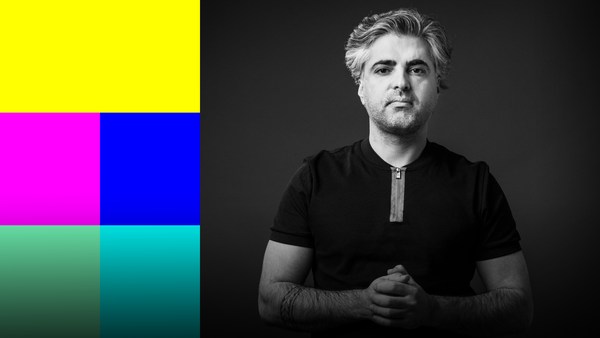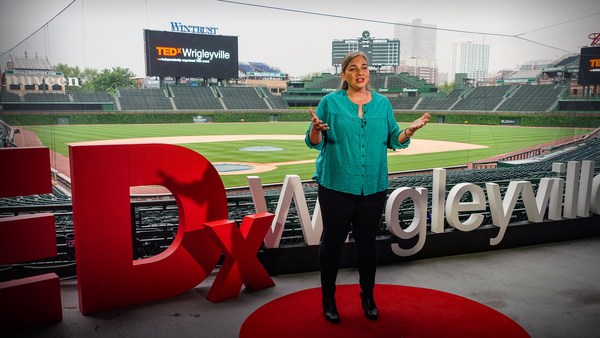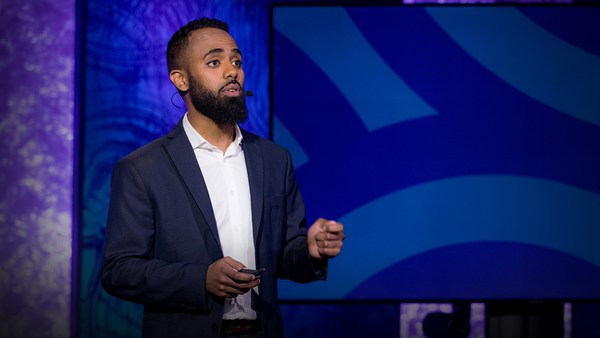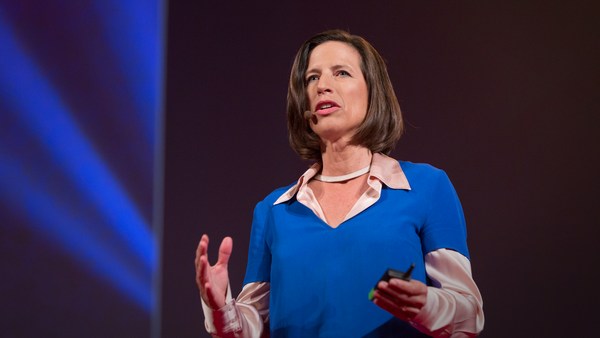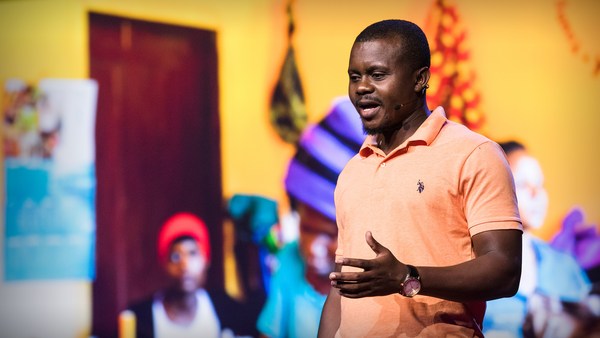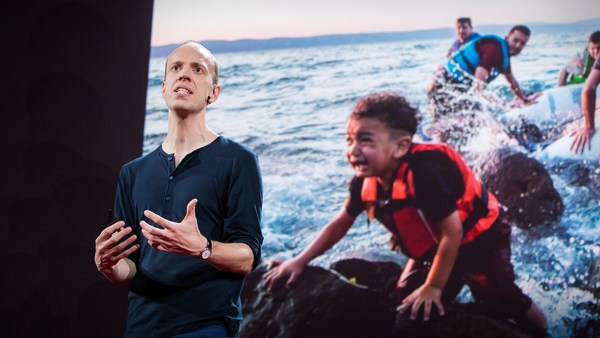I'm Amir Nizar Zuabi. I was born in East Jerusalem, in a tough part of town between Beit Hanina neighborhood and the Shu'fat refugee camp. I'm a mixed child, that means my mother is Jewish and my father is Palestinian. So the refugee experience runs very deep in the DNA of the family. When my Jewish grandparents were fleeing Europe because of World War II, they came to Palestine and drove the other part of my family into exile.
When I was 14, I stumbled by accident into a theater show in this rough part of town, and I fell in love. I fell in love with a reality that was being created in front of me, a reality that was full of possibilities, that was wilder, that was free, a reality that was an opposite contrast of the harsh reality we were living in. And I became a theater practitioner. Becoming a theater practitioner in Palestine is like conjuring water in the desert. We don't have the infrastructure, we don't have the big artistic institutions. What we do have is a need and something to say about the world we live in.
Taking my shows to communities and refugee camps in Palestine, I was always struck by the immediacy of the encounter and that became a very powerful experience for me. In 2015, at the height of the refugee crisis, when hundreds of thousands of people were walking across Europe, with all the pain and the anguish that we saw, I started thinking that maybe we need to create a new model of theater. Maybe we need to take our theater out of the theaters and into the streets, the streets where these people were walking. And I started working with Good Chance theater company, a company that creates theater about the refugee experience. Together, we created "The Walk."
"The Walk" is a rolling arts festival that will cross 8,000 kilometers, 65 cities, towns and villages in its way, and we will create 120 events of welcome. "The Walk" is led by a nine-year-old Syrian girl, an unaccompanied minor called Amal. And Amal in Arabic means hope.
(Music)
Amal is a 3.5-meter puppet created by Handspring Puppet Company, the renowned puppet company from South Africa. "The Walk" will start in the border of Syria-Turkey, in a city called Gaziantep. We will make our way through Turkey and into Greece, then from Greece to Italy, from Italy to southern France, then through Switzerland to Germany, Belgium, and back to northern France, across the English Channel and then from Dover all the way up to Manchester. In order for Amal to make her journey, Amal has three sets of puppeteers to walk her, and each team is trained to give her gesture and nuance, which is what brings Amal to life. Together, there's 12 people in the company, 12 people that come from diverse backgrounds. Together, they will walk Amal all the way from Gaziantep to Manchester, giving her life.
"The Walk" is a very ambitious project. It's a huge logistical feat with all the territory that we need to cover. And it wouldn't be possible without the network of partnerships that we have. We are working with 250 partners along the route and thousands of participants. We're working with a very diverse group of partnerships with humanitarian groups, with civic society, with the mayors of the cities that we're going to visit, with faith leaders, with grassroots refugee organizations, and with the leading institutions and refugee artists in Turkey and Europe.
And to all of them, we asked one simple question. We said, Amal is a nine-year-old girl that will pass through your city. She's alone, she's afraid, she's vulnerable. How would you like to welcome her? What would you learn from her and what will you teach her? And this small proposition harvested an unbelievable amount of generosity and creativity from our partners.
Now, after two years of planning, "The Walk" has started. "The Walk" is a huge play set on an 8,000-kilometer stage. The events that will meet Amal on her way are events created by our partners, and they are big city-scale installations, participatory performances in the cities, precise meetings with communities or with an artistic work across the journey. We hope that these events will become the rich tapestry of Amal's experiences on her epic odyssey.
It's important to say that "The Walk" is not a walk of misery. This is a walk of pride. We want to challenge the perception about the refugees. We want to talk about them not as an issue, not as a problem, but to talk about the potential they bring, about the cultural riches they come from and to honor their experience. We want to turn this into a celebration of shared humanity and hope.
We hope that "The Walk" will leave in its wake, all the way from the edge of Turkey to Manchester, a network of thousands of people of good will, a wide corridor of friendship, and a new way of thinking about what it means to be a refugee in today's world. Everybody can follow Amal along her journey through the continuous updates on our website and on our social media. And I invite every one of you to welcome Amal in your own way.
(Music)
Thank you.
(Applause)
Chris Anderson: How special is that. I'm hoping we have a live connection now to Nizar. Wow.
(Cheering and applause)
Nizar, I hope you can see already the extraordinary reaction to this project you've done. Can you tell us how is "The Walk" going?
ANZ: Well, I'm a babysitter of a very demanding nine-year-old, and she's very big and demanding, but it's really exciting and the responses have been unbelievable.
CA: In your talk, you talk about the soft power of the arts to change minds. Are you seeing evidence of that right now that this is working?
ANZ: I hope so. We are meeting communities and children and adults and they meet her. And I hope she inspires the refugee children that she meets to think big. I hope she inspires the adults to feel compassion. She is very exciting to everybody who meets her, that's for sure. What will last after we pass through these cities, I hope, is a curiosity towards the other, towards somebody that you don't know and you want to know more about.
CA: So how is she doing? May we possibly meet her?
ANZ: With the amount of noise outside, I think she is here. (Cheering) She's coming our way.
CA: So there are people walking with her every step of the way, including people who have had their own refugee experience, correct?
ANZ: Yeah, we're meeting a lot of refugee community that are involved in planning the activities, and they also walk with us when we need them. So that's very exciting.
CA: Wow. (Laughs) Nizar, tell us more about this extraordinary artistic vision, this creation, this little girl.
ANZ: She is very, very warmly received everywhere. And the events try to capture the hardship of her experiences. Some of the events are very sad in a way, but very honest to the refugee experience. And some events are like today, a bit more jubilant and joyful, and involve the community gathering around her and welcoming her. So it's a mixture of the hardship, but also the welcome and the warm reception some communities give to refugees.
CA: Well, it's been an extraordinary privilege for us to eavesdrop on "The Walk" there. This is an amazing project. It's a deeply inspiring project. And it must be extraordinary for you to see years of vision for this come into reality. So thank you for it. We thank you so much for this. Thank you.
ANZ: Thank you so much. Thank you.
(Applause)
